Search Result
Results for "
ROS1 inhibitor
" in MedChemExpress (MCE) Product Catalog:
5
Isotope-Labeled Compounds
| Cat. No. |
Product Name |
Target |
Research Areas |
Chemical Structure |
-
- HY-131003
-
|
DS-6051b; AB-106; IBI-344
|
ROS Kinase
|
Cancer
|
|
Taletrectinib (DS-6051b) is a potent, orally active, and next-generation selective ROS1/NTRK inhibitor. Taletrectinib potently inhibits recombinant ROS1, NTRK1, NTRK2, and NTRK3 with IC50s of 0.207, 0.622, 2.28, and 0.98 nM, respectively. Taletrectinib also inhibits ROS1 G2032R and other Crizotinib-resistant ROS1 mutants .
|
-
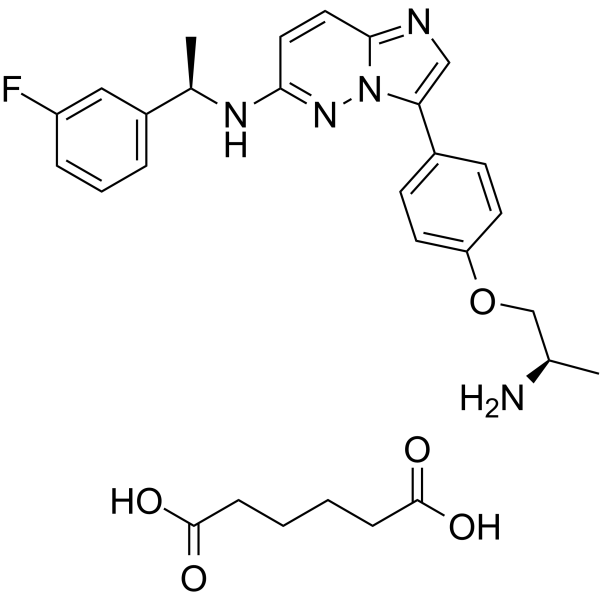
-
- HY-157391
-
-
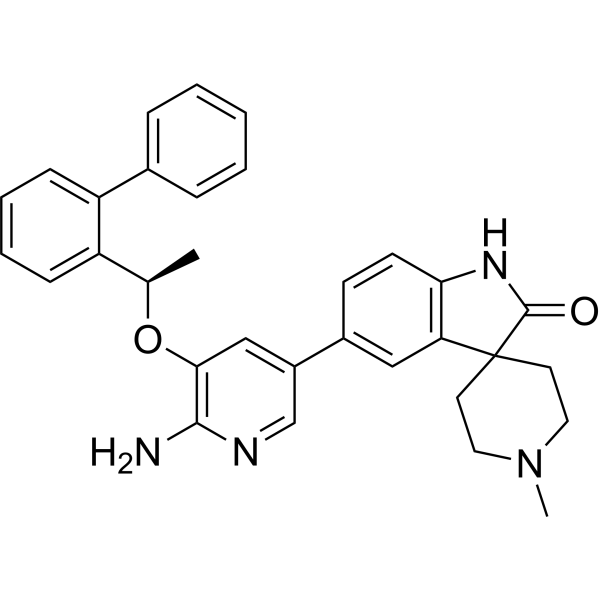
-
- HY-150974
-
|
|
ROS Kinase
|
Cancer
|
|
ROS1-IN-1 (Compound 31) is a potent and selective ROS1 kinase inhibitor with an IC50 of 0.097 μM .
|
-
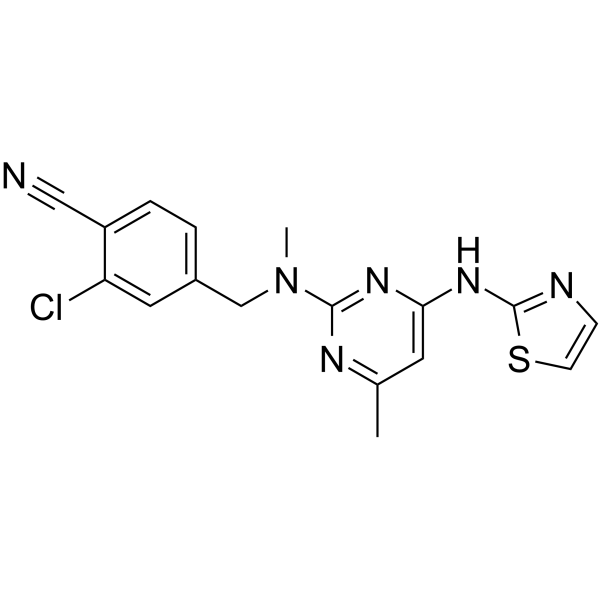
-
- HY-160172
-
-
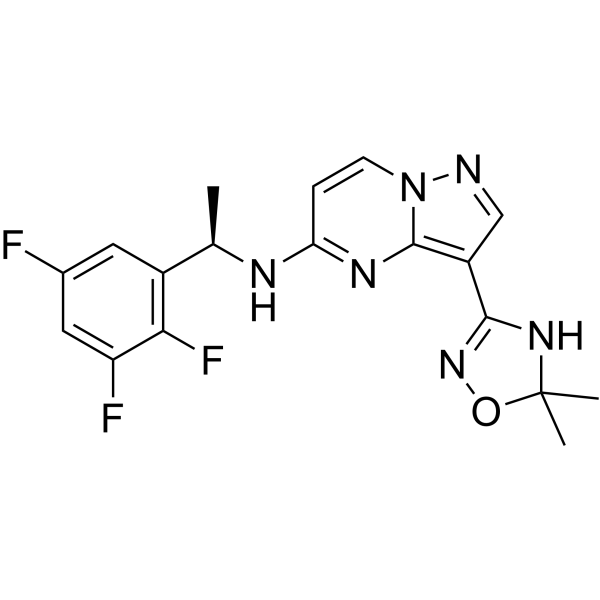
-
- HY-160172A
-
-
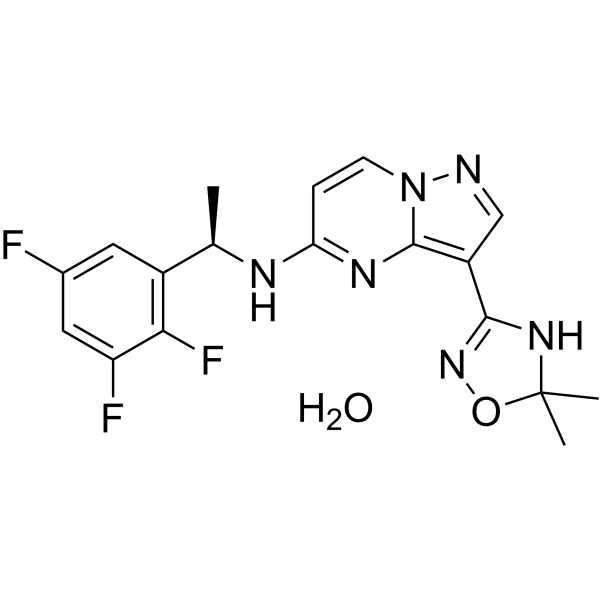
-
- HY-130794
-
-
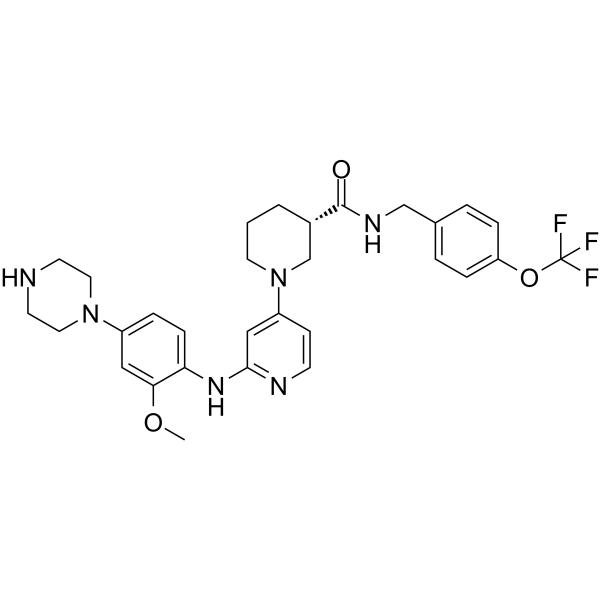
-
- HY-131003A
-
|
DS-6051b free base; AB-106 free base; IBI-344 free base
|
ROS Kinase
|
Cancer
|
|
Taletrectinib (DS-6051b) free base is a potent, orally active, and next-generation selective ROS1/NTRK inhibitor. Taletrectinib free base potently inhibits recombinant ROS1, NTRK1, NTRK2, and NTRK3 with IC50s of 0.207, 0.622, 2.28, and 0.98 nM, respectively. Taletrectinib free base also inhibits ROS1 G2032R and other Crizotinib-resistant ROS1 mutants .
|
-
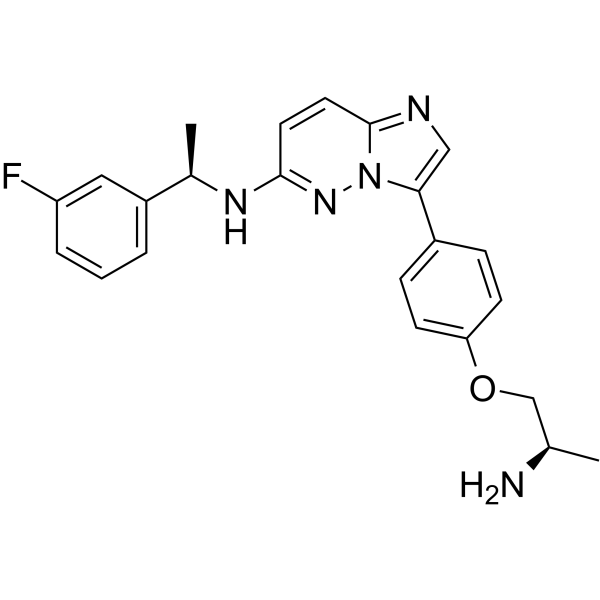
-
- HY-152292
-
|
NVL-520
|
ROS Kinase
|
Cancer
|
|
Zidesamtinib (NVL-520) is a potent, selective, orally active and brain-penetrant inhibitor of diverse ROS1 fusions and resistance mutations, with IC50s of 0.7 and 7.9 nM for wild-type ROS1 and ROS1 G2032R, respectively, and spares TRK inhibition. Zidesamtinib can be used for the research of cancer .
|
-
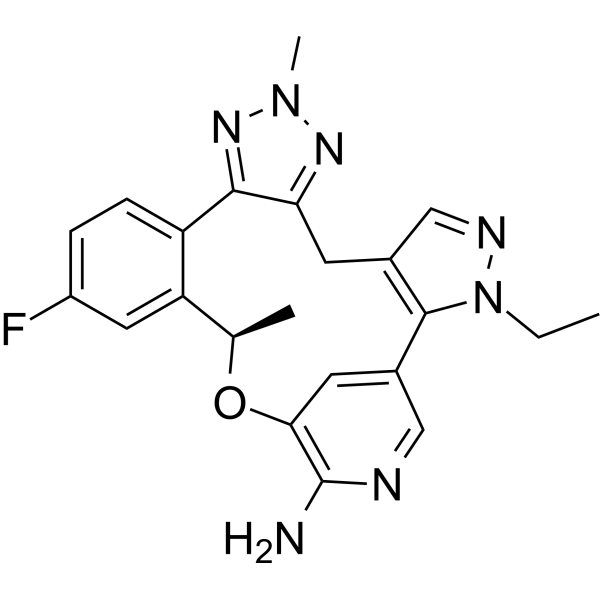
-
- HY-145574
-
|
WX-0593
|
Anaplastic lymphoma kinase (ALK)
ROS Kinase
|
Cancer
|
|
Iruplinalkib (WX-0593) is a potent, selective, and orally active inhibitor of ALK and ROS1 tyrosine kinase. Iruplinalkib (WX-0593) shows favorable safety and promising antitumor activity in advanced NSCLC with ALK or ROS1 rearrangement .
|
-
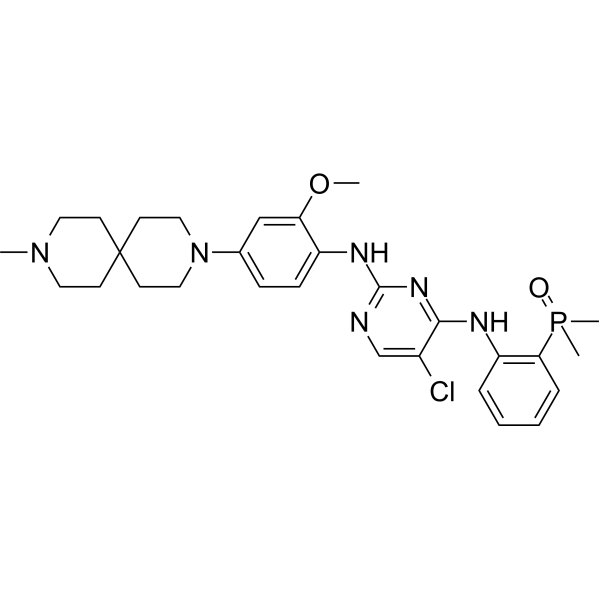
-
- HY-112801
-
|
|
Anaplastic lymphoma kinase (ALK)
ROS Kinase
|
Cancer
|
|
F-1 is a potent ALK and ROS1 dual inhibitor, suppresses phospho-ALK and its relative downstream signaling pathways, with IC50s of 2.1 nM, 2.3 nM, 1.3 nM and 3.9 nM for ALK WT, ROS1 WT, ALK L1196M and ALK G1202R, respectively .
|
-
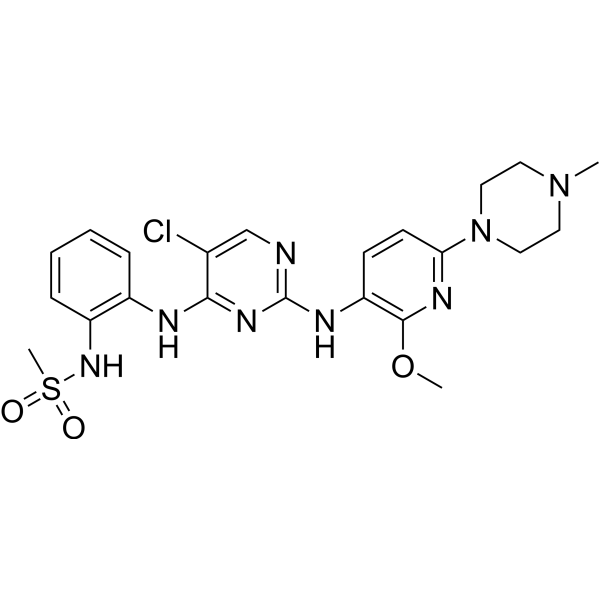
-
- HY-111416
-
-
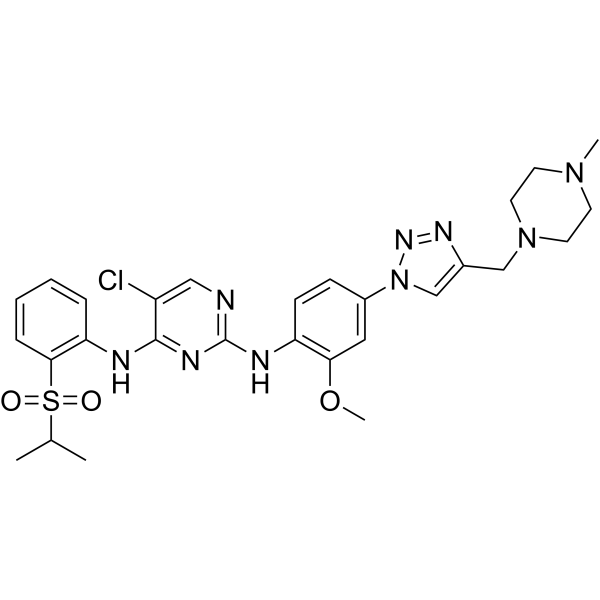
-
- HY-153743
-
|
|
ROS Kinase
Trk Receptor
|
Cancer
|
|
Protein kinase inhibitor 4 (Compound 3) is a protein kinase inhibitor that inhibits TRK-A and ROS1 (IC50=3.0 nM and 104 nM respectively) .
|
-
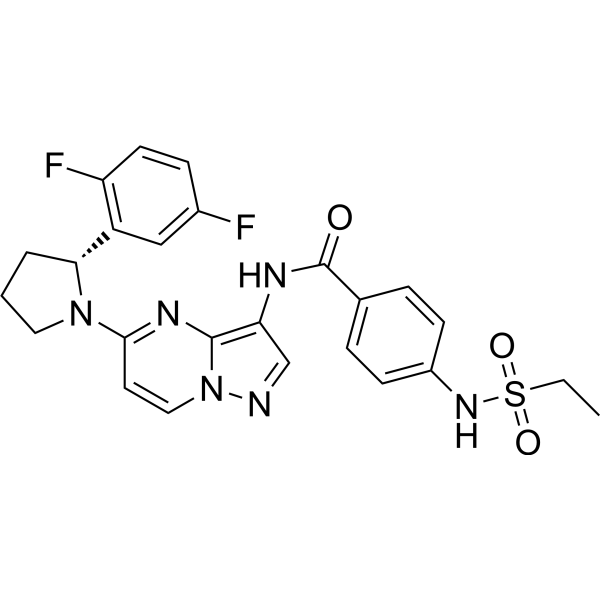
-
- HY-12215
-
|
PF-06463922
|
Anaplastic lymphoma kinase (ALK)
ROS Kinase
Apoptosis
|
Cancer
|
|
Lorlatinib (PF-06463922) is a selective, orally active, brain-penetrant and ATP-competitive ROS1/ALK inhibitor with anticancer activity. Lorlatinib has Kis of <0.025 nM, <0.07 nM, and 0.7 nM for ROS1, wild type ALK, and ALK L1196M, respectively. Lorlatinib targets to EML4-ALK, and inhibits ALK phosphorylation with IC50s of 15-43 nM (ALK L1196), 14-80 nM (ALK G1269A), 38-50 nM (ALK 1151Tins), 77-113 nM (ALK G1202R), respectively .
|
-
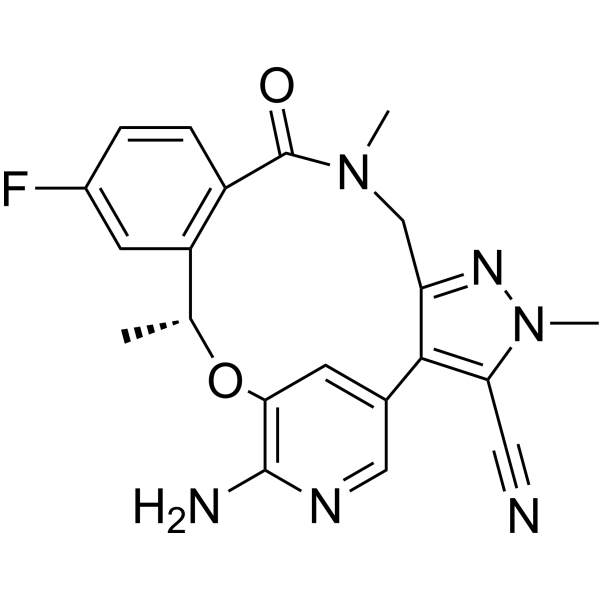
-
- HY-155163
-
-
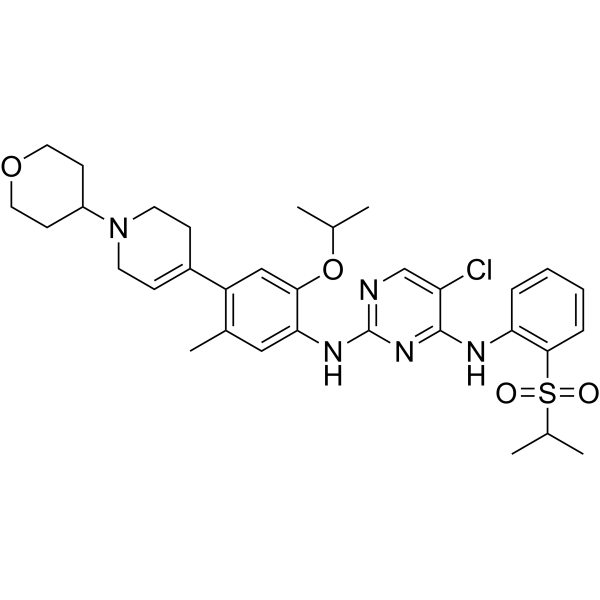
-
- HY-147413
-
|
TQ-B3101
|
EGFR
|
Cancer
|
|
Unecritinib (TQ-B3101) is a potent EGFR tyrosine kinase inhibitor. Unecritinib shows anticancer activity. Unecritinib inhibits ALK, ROS1, and MET. Unecritinib has the potential for the research of solid tumor and relapsed or refractory ALK-positive anaplastic large cell lymphoma .
|
-
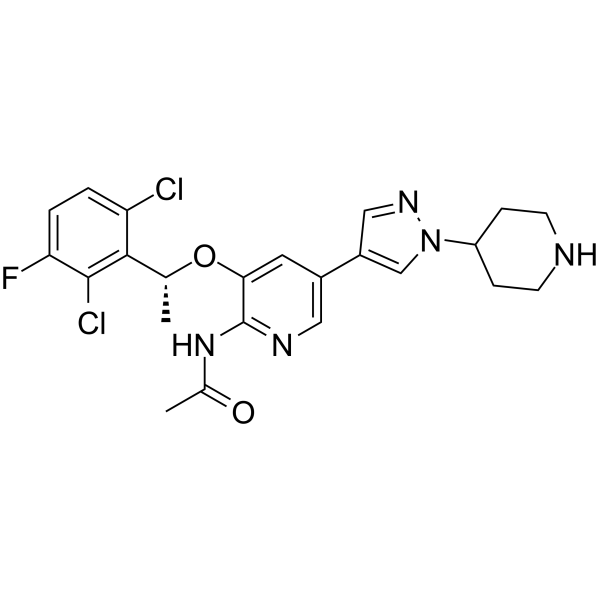
-
- HY-103022
-
-
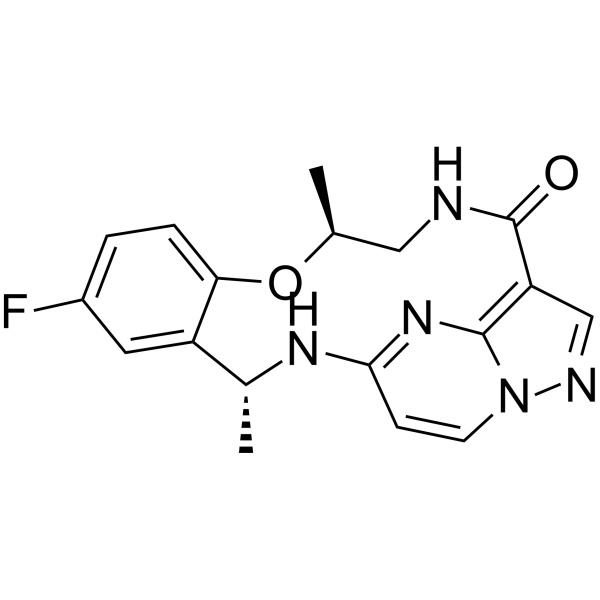
-
- HY-12678
-
|
NMS-E628; RXDX-101
|
ROS Kinase
Trk Receptor
Anaplastic lymphoma kinase (ALK)
Autophagy
|
Cancer
|
|
Entrectinib (NMS-E628) is an orally active, BBB-penetrated and centrally active inhibitor of TrkA/B/C, ROS1 and ALK, with IC50 values of 1, 3, 5, 12 and 7 nM, respectively. Entrectinib induces apoptosis and cycle arrest in cancer cells, has antitumor activity, and attenuates bleomycin-induced lung fibrosis in mice .
|
-
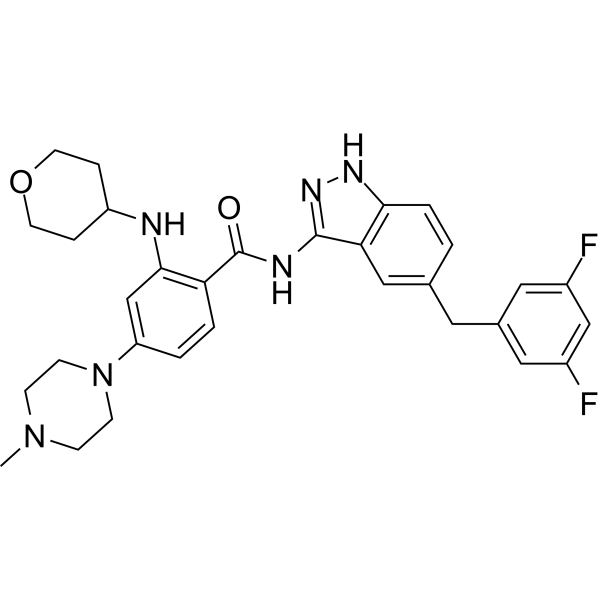
-
- HY-50878
-
Crizotinib
Maximum Cited Publications
61 Publications Verification
PF-02341066
|
Anaplastic lymphoma kinase (ALK)
c-Met/HGFR
ROS Kinase
Autophagy
|
Cancer
|
|
Crizotinib (PF-02341066) is an orally bioavailable, ATP-competitive ALK and c-Met inhibitor with IC50s of 20 and 8 nM, respectively. Crizotinib inhibits tyrosine phosphorylation of NPM-ALK and tyrosine phosphorylation of c-Met with IC50s of 24 and 11 nM in cell-based assays, respectively. Crizotinib is also a ROS1 inhibitor. Crizotinib has effective tumor growth inhibition .
|
-
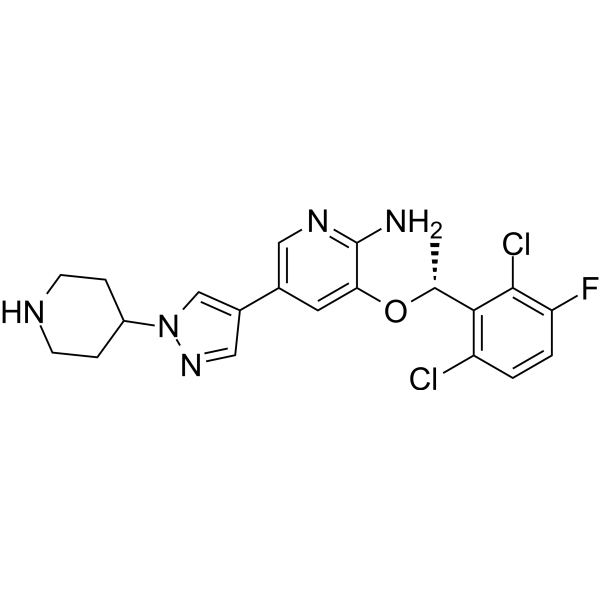
-
- HY-50878B
-
|
PF-02341066 acetate
|
Anaplastic lymphoma kinase (ALK)
ROS Kinase
c-Met/HGFR
|
Cancer
|
|
Crizotinib (PF-02341066) acetate is an orally bioavailable, ATP-competitive ALK and c-Met inhibitor with IC50s of 20 and 8 nM, respectively. Crizotinib acetate inhibits tyrosine phosphorylation of NPM-ALK and tyrosine phosphorylation of c-Met with IC50s of 24 and 11 nM in cell-based assays, respectively. Crizotinib acetate is also a ROS1 inhibitor. Crizotinib acetate has effective tumor growth inhibition .
|
-
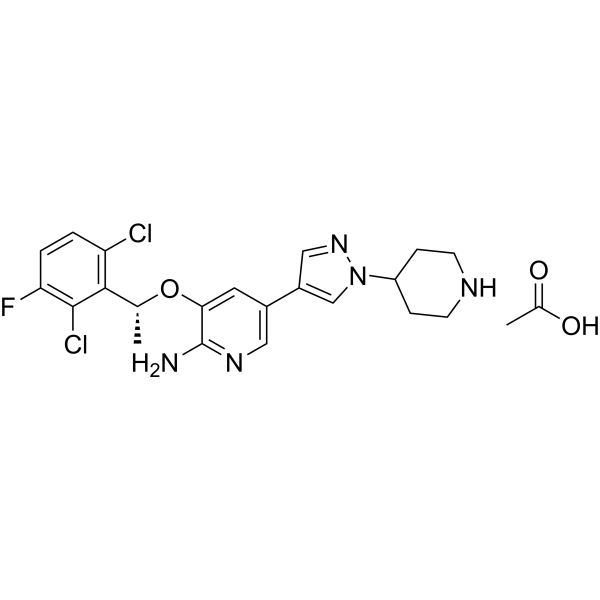
-
- HY-B0847S
-
|
|
Fungal
Reactive Oxygen Species
|
Infection
|
|
Propiconazole-d7 is the deuterium labeled Propiconazole. Propiconazole is a broad-spectrum triazole fungicide that inhibits the conversion of lanosterol to ergosterol, leading to fungal cell membrane disruption. Propiconazole inhibits S. cerevisiae, but not rat liver, microsomal cytochrome P450 (IC50s=0.04 and >200 µM, respectively). Propiconazole inhibits the growth of T. deformans and R. stolonifer (ED50s=0.073 and 4.6 µg/mL, respectively). Propiconazole increases production of reactive oxygen species (ROS)[1].
|
-
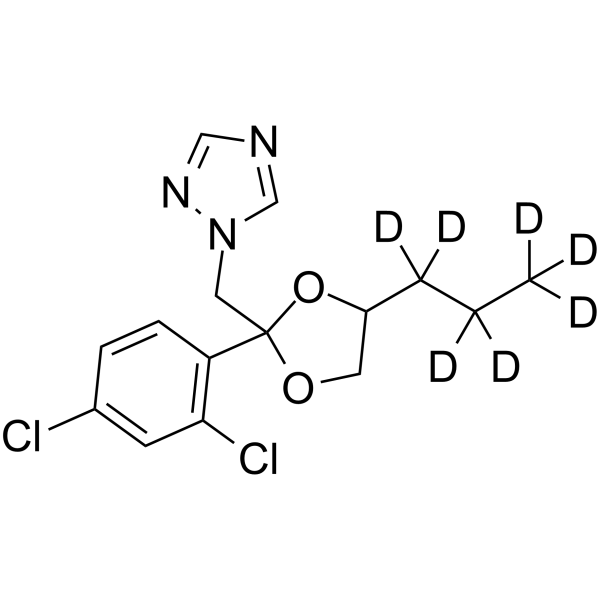
-
- HY-50878S
-
|
PF-02341066-d5
|
Anaplastic lymphoma kinase (ALK)
c-Met/HGFR
ROS Kinase
Autophagy
|
Cancer
|
|
Crizotinib-d5 is the deuterium labeled Crizotinib. Crizotinib (PF-02341066) is an orally bioavailable, ATP-competitive ALK and c-Met inhibitor with IC50s of 20 and 8 nM, respectively. Crizotinib inhibits tyrosine phosphorylation of NPM-ALK and tyrosine phosphorylation of c-Met with IC50s of 24 and 11 nM in cell-based assays, respectively. Crizotinib is also a ROS1 inhibitor. Crizotinib has effective tumor growth inhibition .
|
-
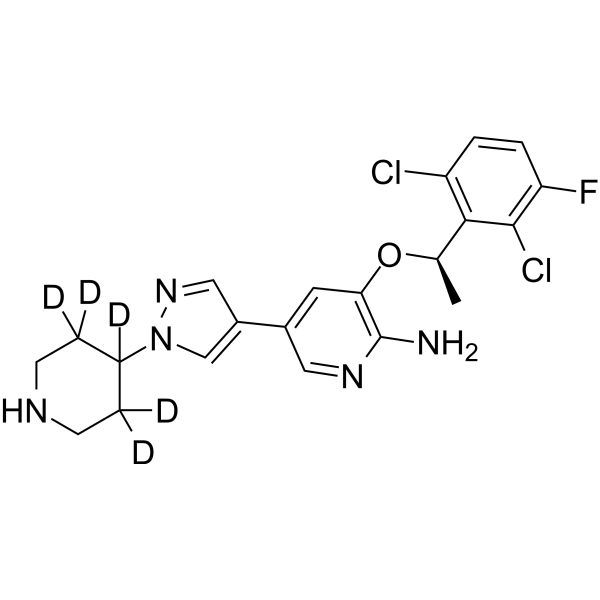
-
- HY-50878A
-
|
PF-02341066 hydrochloride
|
Anaplastic lymphoma kinase (ALK)
c-Met/HGFR
ROS Kinase
Autophagy
|
Cancer
|
|
Crizotinib hydrochloride (PF-02341066 hydrochloride) is an orally bioavailable, selective, and ATP-competitive dual ALK and c-Met inhibitor with IC50s of 20 and 8 nM, respectively. Crizotinib hydrochloride (PF-02341066 hydrochloride) inhibits tyrosine phosphorylation of NPM-ALK and tyrosine phosphorylation of c-Met with IC50s of 24 and 11 nM in cell-based assays, respectively. It is also a ROS proto-oncogene 1 (ROS1) inhibitor. Crizotinib hydrochloride (PF-02341066 hydrochloride) has effective tumor growth inhibition .
|
-
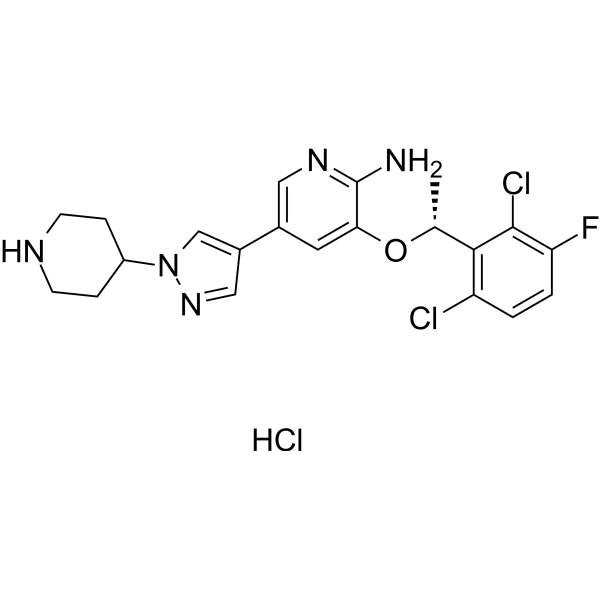
-
- HY-12678S
-
|
NMS-E628-d4; RXDX-101-d4
|
ROS Kinase
Trk Receptor
Anaplastic lymphoma kinase (ALK)
Autophagy
Isotope-Labeled Compounds
|
Cancer
|
|
Entrectinib-d4 (NMS-E628-d4; RXDX-101-d4) is the deuterium labeled Entrectinib (HY-12678). Entrectinib is an orally active, BBB-penetrated and centrally active inhibitor of TrkA/B/C, ROS1 and ALK, with IC50 values of 1, 3, 5, 12 and 7 nM, respectively. Entrectinib induces apoptosis and cycle arrest in cancer cells, has antitumor activity, and attenuates bleomycin-induced lung fibrosis in mice .
|
-
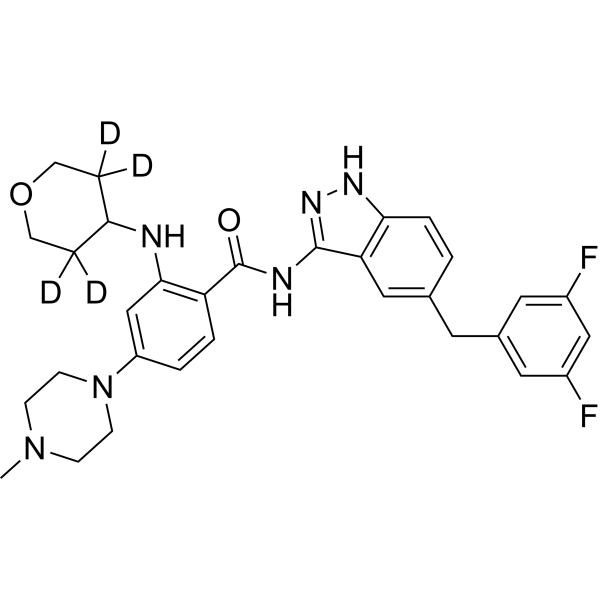
-
- HY-50878AS
-
|
PF-02341066-d9 hydrochloride
|
c-Met/HGFR
Autophagy
Anaplastic lymphoma kinase (ALK)
ROS Kinase
Isotope-Labeled Compounds
|
Cancer
|
|
Crizotinib-d9 hydrochloride is deuterated labeled Crizotinib hydrochloride (HY-50878A). Crizotinib hydrochloride (PF-02341066 hydrochloride) is an orally bioavailable, selective, and ATP-competitive dual ALK and c-Met inhibitor with IC50s of 20 and 8 nM, respectively. Crizotinib hydrochloride (PF-02341066 hydrochloride) inhibits tyrosine phosphorylation of NPM-ALK and tyrosine phosphorylation of c-Met with IC50s of 24 and 11 nM in cell-based assays, respectively. It is also a ROS proto-oncogene 1 (ROS1) inhibitor. Crizotinib hydrochloride (PF-02341066 hydrochloride) has effective tumor growth inhibition .
|
-
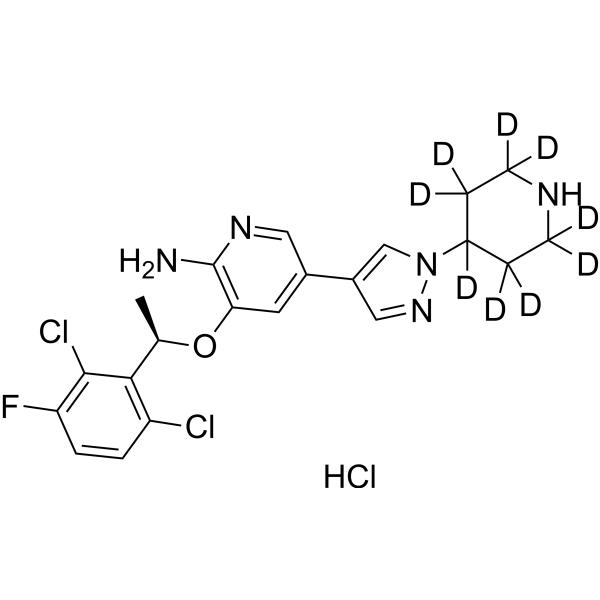
-
- HY-15514A
-
|
LY2801653 dihydrochloride
|
c-Met/HGFR
FLT3
ROS Kinase
Discoidin Domain Receptor
|
Cancer
|
|
Merestinib dihydrochloride (LY2801653 dihydrochloride) is a potent, orally bioavailable c-Met inhibitor (Ki=2 nM) with anti-tumor activities. Merestinib dihydrochloride also has potent activity against MST1R (IC50=11 nM), FLT3 (IC50=7 nM), AXL (IC50=2 nM), MERTK (IC50=10 nM), TEK (IC50=63 nM), ROS1, DDR1/2 (IC50=0.1/7 nM) and MKNK1/2 (IC50=7 nM) .
|
-
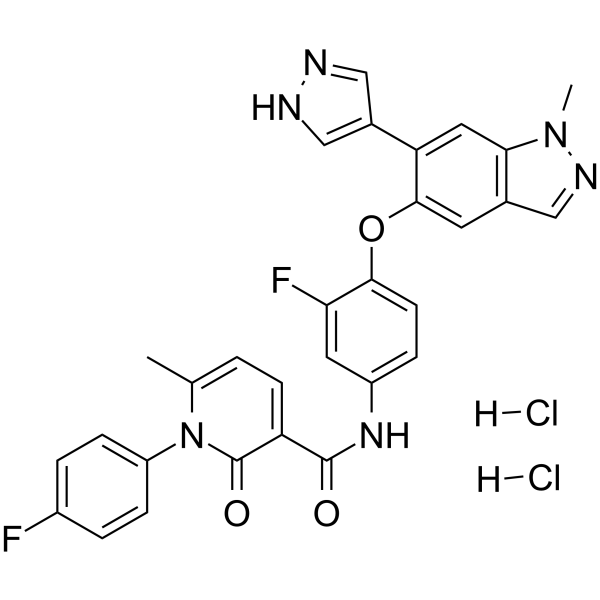
-
- HY-15514
-
|
LY2801653
|
c-Met/HGFR
FLT3
ROS Kinase
Discoidin Domain Receptor
|
Cancer
|
|
Merestinib (LY2801653) is a potent, orally bioavailable c-Met inhibitor (Ki=2 nM) with anti-tumor activities. Merestinib (LY2801653) also has potent activity against MST1R (IC50=11 nM), FLT3 (IC50=7 nM), AXL (IC50=2 nM), MERTK (IC50=10 nM), TEK (IC50=63 nM), ROS1, DDR1/2 (IC50=0.1/7 nM) and MKNK1/2 (IC50=7 nM) .
|
-
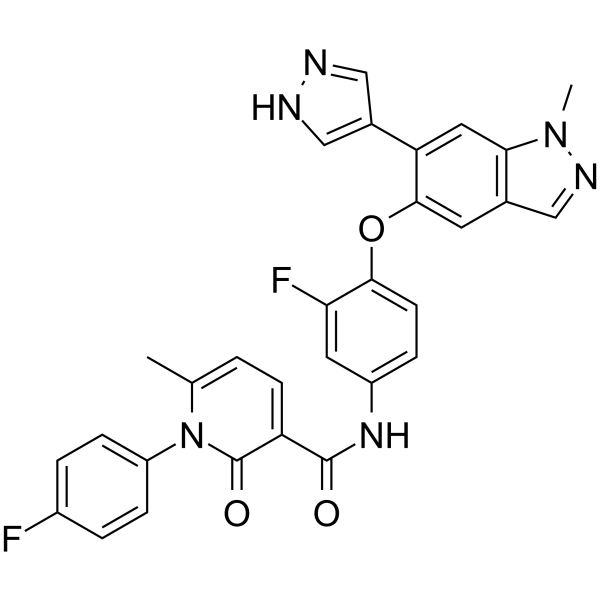
-
- HY-12678S1
-
|
NMS-E628-d8; RXDX-101-d8
|
Isotope-Labeled Compounds
Autophagy
Anaplastic lymphoma kinase (ALK)
Trk Receptor
ROS Kinase
|
Cancer
|
|
Entrectinib-d8 (NMS-E628-d8; RXDX-101-d8) is a deuterated version of Entrectinib (HY-12678). Entrectinib (NMS-E628) is an orally available, blood-brain barrier permeable, central nervous system active TrkA/B/C, ROS1 and ALK inhibitor with IC50 values of 1, 3, 5, 12 and 12, respectively. 7 nM. Entrectinib induces apoptosis and cycle arrest in cancer cells, has anti-tumor activity, and also alleviates bleomycin-induced pulmonary fibrosis in mice .
|
-
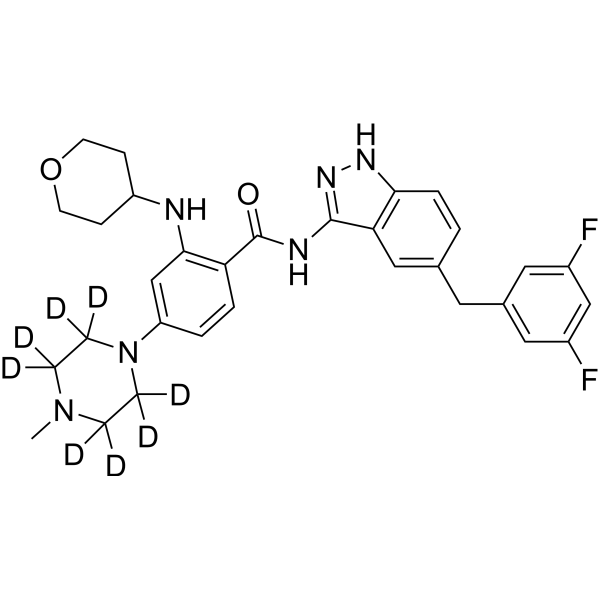
-
- HY-155178
-
|
|
EGFR
|
Cancer
|
|
Antiproliferative agent-34 (Compound A14) is a multi-target kinase inhibitor, with an IC50 of 177 nM and 1567 nM for EGFR L858R/T790M and EGFR WT. Antiproliferative agent-34 also inhibits JAK2, ROS1, FLT3, FLT4, PDGFRα with IC50 of 30.93, 106.90, 108.00, 226.60, 42.53 nM. Antiproliferative agent-34 inhibits H1975 and HCC827 cells proliferation with IC50 values below 40 nM under normoxic condition, and the anti-proliferation potency achieves 4–6-fold improvement (IC50 values < 10 nM) under hypoxic condition .
|
-
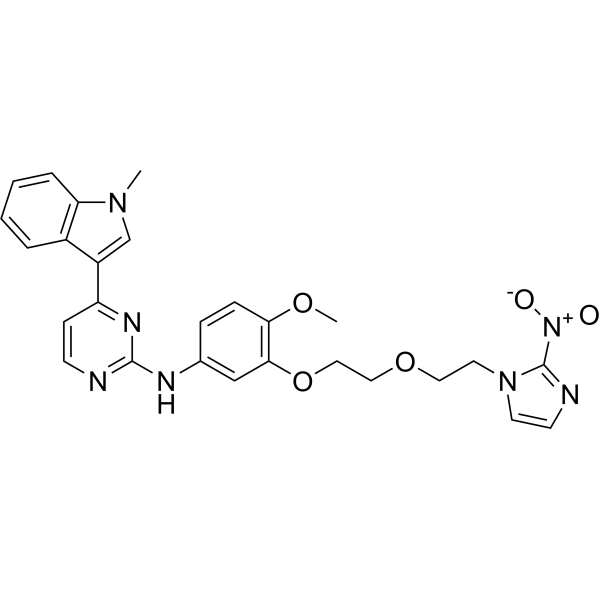
-
- HY-156360
-
-
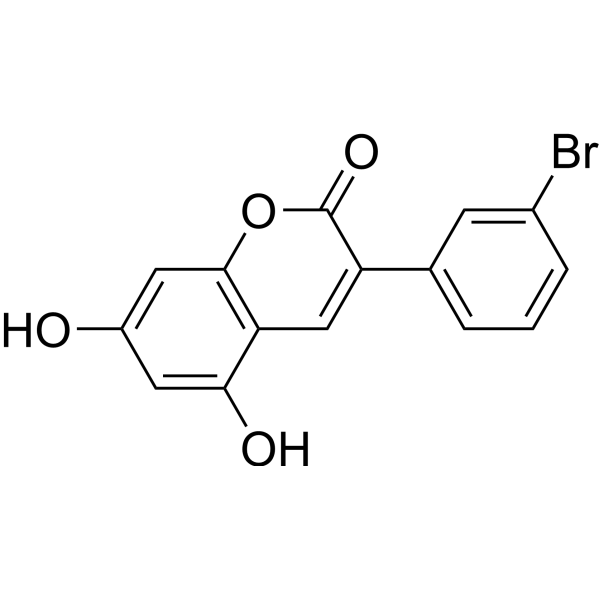
-
- HY-144697
-
-
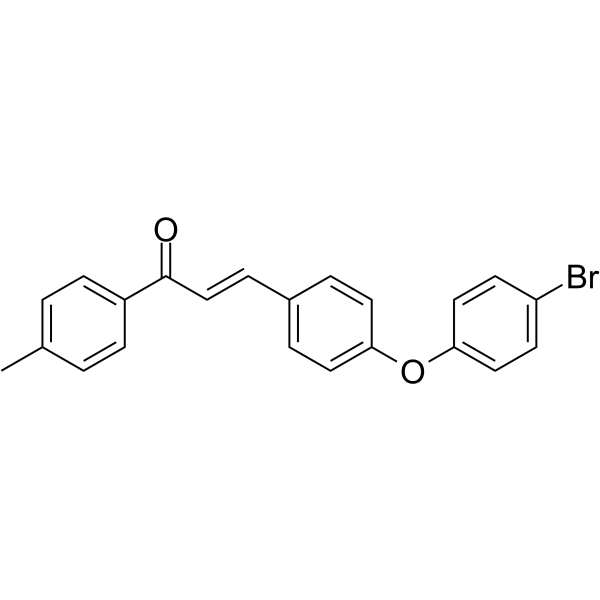
-
- HY-147795
-
|
|
NAMPT
Apoptosis
Reactive Oxygen Species
|
Cancer
|
|
Nampt-IN-8 (Compound 10d) is an NAMPT inhibitor with an IC50 of 0.183 μM. Nampt-IN-8 is also a relatively good NQO1 substrate. Nampt-IN-8 induces cell apoptosis and ROS .
|
-
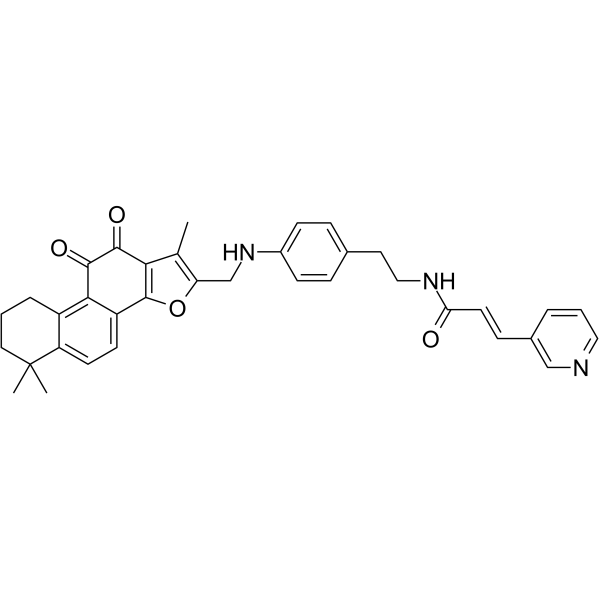
-
- HY-N11887
-
|
|
Reactive Oxygen Species
|
Inflammation/Immunology
|
|
Linocinnamarin is a nature product that could be isolated from Fragaria ananassa Duch. Linocinnamarin has anti-inflammatory activity. Linocinnamarin inhibits antigen-stimulated elevation of intracellular free Ca 2+ concentration and reactive oxygen species (ROS) .
|
-
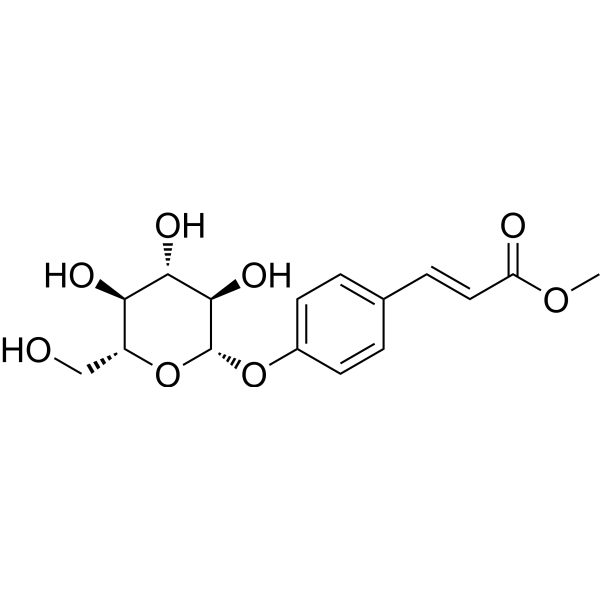
-
- HY-122311
-
|
SMTP-7
|
Reactive Oxygen Species
|
Neurological Disease
Inflammation/Immunology
|
|
Orniplabin (SMTP-7) is a low-molecular-weight compound that enhances plasminogen–fibrin binding, urokinase-catalyzed activation of plasminogen, and urokinase and plasminogen-mediated fibrin degradation. Orniplabin shows potential thrombolytic and anti-inflammatory effects. Orniplabin inhibits ROS .
|
-
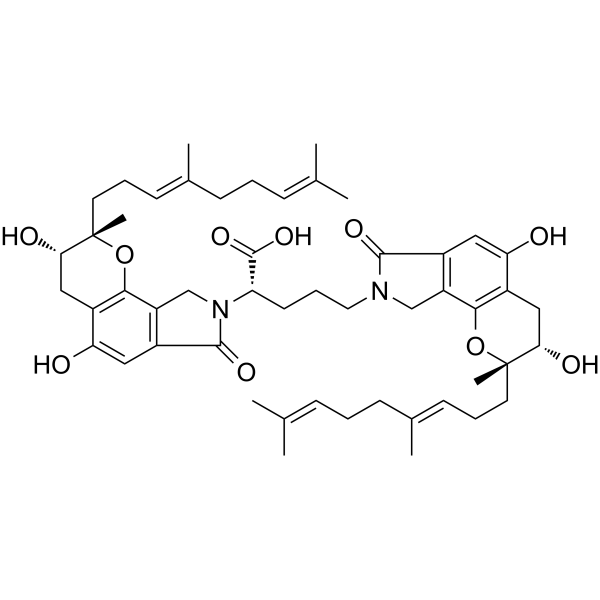
-
- HY-N1306
-
|
|
Bacterial
Reactive Oxygen Species
Apoptosis
|
Infection
Cancer
|
|
Sideroxylin is a C-methylated flavone isolated from Callistemon lanceolatus and exerts antimicrobial activity against Staphylococcus aureus. Sideroxylin inhibits ovarian cancer cell proliferation and induces apoptosis, causing DNA fragmentation, depolarization of the mitochondrial membrane, the generation of reactive oxygen species (ROS) .
|
-
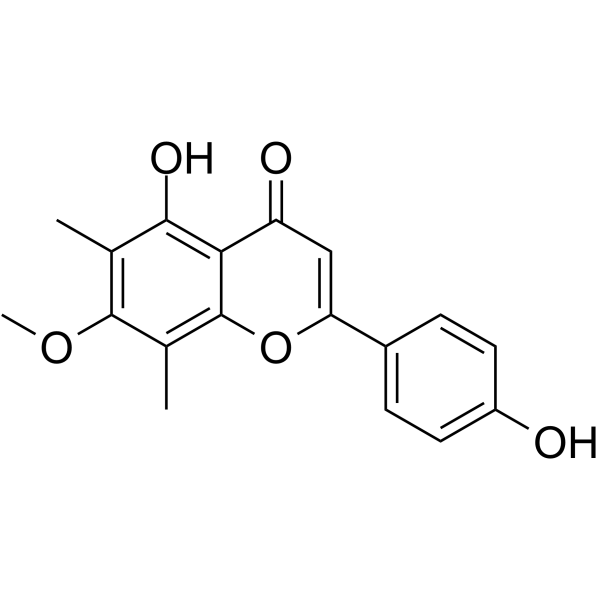
-
- HY-161358
-
|
|
FAK
Apoptosis
|
Cancer
|
|
FAK-IN-20 (Compound 7b) is an inhibitor of FAK with an IC50 value of 0.27 nM. FAK-IN-20 exhibits anticancer activity. It can arrest the cell cycle in the G2/M phase and induce cell apoptosis (apoptosis) by generating ROS .
|
-
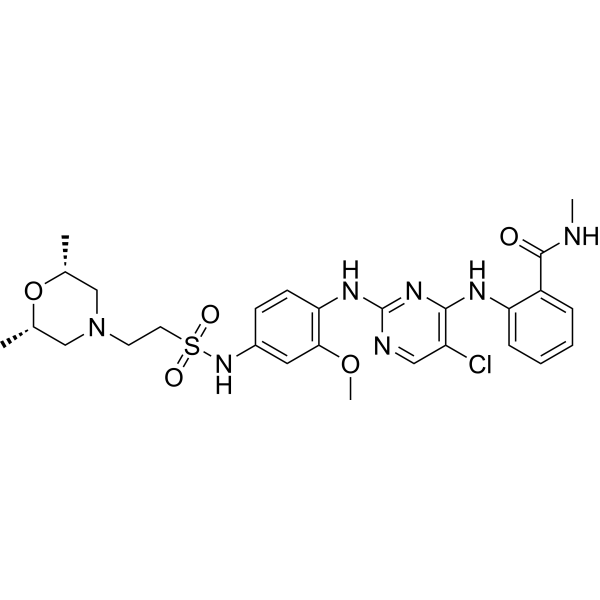
-
- HY-158016
-
|
|
EGFR
Apoptosis
|
Cancer
|
|
Antiproliferative agent-49 (Compound 5a) is a EGFR-TK inhibitor with an IC50 of 0.09 μM. Antiproliferative agent-49 is a anti-proliferative agent. Antiproliferative agent-49 displays good activities against HER3 and HER4 with IC50 values 0.18 and 0.37 µM. Antiproliferative agent-49 induces mitochondrial apoptotic pathway and increased accumulation of ROS .
|
-
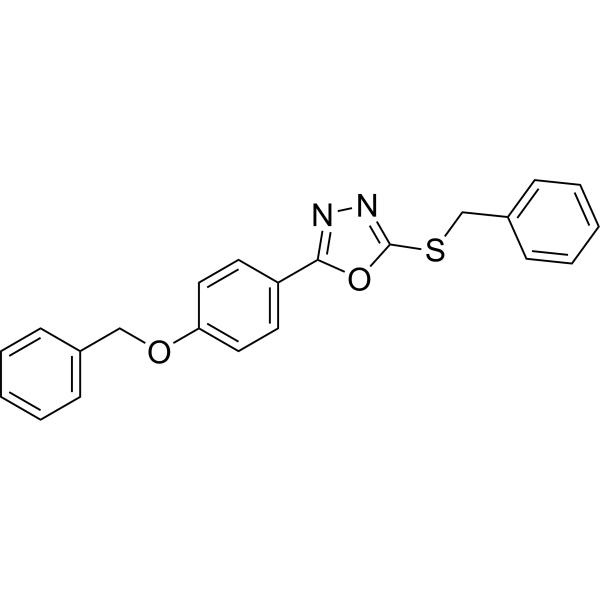
-
- HY-157437
-
|
|
Cholinesterase (ChE)
Reactive Oxygen Species
|
Neurological Disease
Inflammation/Immunology
|
|
AChE/BChE-IN-16 (compound C7) is a potent cholinesterase (ChE) inhibitor with IC50s of 30 nM and 48 nM for human acetylcholinesterase (hAChE) and human butyrylcholinesterase (hBChE), respectively. AChE/BChE-IN-16 exhibits a remarkable capacity to safeguard PC12 cells against H2O2-induced apoptosis and effectively suppresses the production of reactive oxygen species (ROS) .
|
-
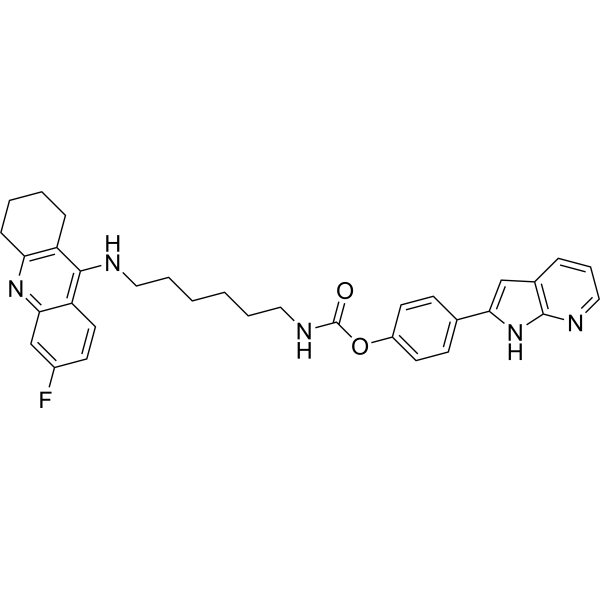
| Cat. No. |
Product Name |
Category |
Target |
Chemical Structure |
| Cat. No. |
Product Name |
Chemical Structure |
-
- HY-50878S
-
|
|
|
Crizotinib-d5 is the deuterium labeled Crizotinib. Crizotinib (PF-02341066) is an orally bioavailable, ATP-competitive ALK and c-Met inhibitor with IC50s of 20 and 8 nM, respectively. Crizotinib inhibits tyrosine phosphorylation of NPM-ALK and tyrosine phosphorylation of c-Met with IC50s of 24 and 11 nM in cell-based assays, respectively. Crizotinib is also a ROS1 inhibitor. Crizotinib has effective tumor growth inhibition .
|
-

-
- HY-B0847S
-
|
|
|
Propiconazole-d7 is the deuterium labeled Propiconazole. Propiconazole is a broad-spectrum triazole fungicide that inhibits the conversion of lanosterol to ergosterol, leading to fungal cell membrane disruption. Propiconazole inhibits S. cerevisiae, but not rat liver, microsomal cytochrome P450 (IC50s=0.04 and >200 µM, respectively). Propiconazole inhibits the growth of T. deformans and R. stolonifer (ED50s=0.073 and 4.6 µg/mL, respectively). Propiconazole increases production of reactive oxygen species (ROS)[1].
|
-

-
- HY-12678S
-
|
|
|
Entrectinib-d4 (NMS-E628-d4; RXDX-101-d4) is the deuterium labeled Entrectinib (HY-12678). Entrectinib is an orally active, BBB-penetrated and centrally active inhibitor of TrkA/B/C, ROS1 and ALK, with IC50 values of 1, 3, 5, 12 and 7 nM, respectively. Entrectinib induces apoptosis and cycle arrest in cancer cells, has antitumor activity, and attenuates bleomycin-induced lung fibrosis in mice .
|
-

-
- HY-50878AS
-
|
|
|
Crizotinib-d9 hydrochloride is deuterated labeled Crizotinib hydrochloride (HY-50878A). Crizotinib hydrochloride (PF-02341066 hydrochloride) is an orally bioavailable, selective, and ATP-competitive dual ALK and c-Met inhibitor with IC50s of 20 and 8 nM, respectively. Crizotinib hydrochloride (PF-02341066 hydrochloride) inhibits tyrosine phosphorylation of NPM-ALK and tyrosine phosphorylation of c-Met with IC50s of 24 and 11 nM in cell-based assays, respectively. It is also a ROS proto-oncogene 1 (ROS1) inhibitor. Crizotinib hydrochloride (PF-02341066 hydrochloride) has effective tumor growth inhibition .
|
-

-
- HY-12678S1
-
|
|
|
Entrectinib-d8 (NMS-E628-d8; RXDX-101-d8) is a deuterated version of Entrectinib (HY-12678). Entrectinib (NMS-E628) is an orally available, blood-brain barrier permeable, central nervous system active TrkA/B/C, ROS1 and ALK inhibitor with IC50 values of 1, 3, 5, 12 and 12, respectively. 7 nM. Entrectinib induces apoptosis and cycle arrest in cancer cells, has anti-tumor activity, and also alleviates bleomycin-induced pulmonary fibrosis in mice .
|
-

Your information is safe with us. * Required Fields.
Inquiry Information
- Product Name:
- Cat. No.:
- Quantity:
- MCE Japan Authorized Agent:













































